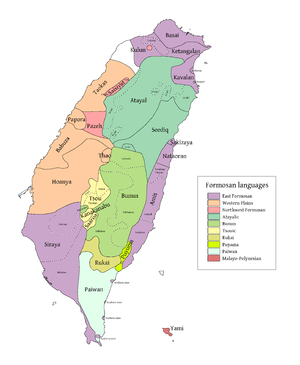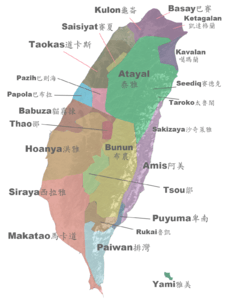Paiwan language
| Paiwan | |
|---|---|
| Native to | Taiwan |
| Ethnicity | Paiwan |
Native speakers | 66,000 (2002)[1] |
|
Austronesian
| |
| Language codes | |
| ISO 639-3 |
pwn |
| Glottolog |
paiw1248[2] |
|
(dark green, south) Paiwan | |
| Paiwan language test of Wikipedia at Wikimedia Incubator |
Paiwan is a native language of Taiwan, spoken by the Paiwan people, one tribe of the Taiwanese aborigines. Paiwan is a Formosan language of the Austronesian language family. The number of speakers is estimated to be 66,000.[3]
Dialects
Paiwan variants can be divided into the following dialect zones (Ferrell 1982:4–6).
- A1 – southern and central
- Kuɬaɬau (Kulalao) – used in Ferrell's 1982 Paiwan Dictionary due to its widespread intelligibility and preservation of various phonemic distinctions; also spoken in Tjuabar Village, Taitung County, where Tjariḍik and "Tjuabar" (closely related to Tjavuaɬi) are also spoken.
- Kapaiwanan (Su-Paiwan)
- Tjuaqatsiɬay (Kachirai) – southernmost dialect
- A2 – central
- ɬarəkrək (Riki-riki)
- Patjavaɬ (Ta-niao-wan)
- B1 – northernmost
- Tjukuvuɬ (Tokubun)
- Kaviangan (Kapiyan)
- B2 – northwestern
- Tjaɬakavus (Chalaabus, Lai-yi)
- Makazayazaya (Ma-chia)
- B3 – east-central
- Tjariḍik (Charilik)
- B4 – eastern
- Tjavuaɬi (Taimali)
- Tjakuvukuvuɬ (Naibon, Chaoboobol)
Phonology
Kuɬaɬau Paiwan has 23–24 consonants (/h/ is found only in loanwords, and /ʔ/ is uncommon) and 4 vowels (Ferrell 1982:7). Unlike many other Formosan languages that have merged many Proto-Austronesian phonemes, Paiwan preserves most Proto-Austronesian phonemes and is thus highly important for reconstruction purposes.
The four Paiwan vowels are /i ə a u/. /ə/ is written e in the literature.
| labial | alveolar | retroflex | palatal | velar | uvular | glottal | |
|---|---|---|---|---|---|---|---|
| nasal | m | n | ŋ | ||||
| plosive | p b | t d | ɖ | c ɟ | k ɡ | q | ʔ |
| affricate | ts | ||||||
| fricative | v | s z | (h) | ||||
| trill | r | ||||||
| approximant | w | l ɬ | j |
| labial | alveolar | retroflex | palatal | velar | uvular | glottal | |
|---|---|---|---|---|---|---|---|
| nasal | m | n | ŋ | ||||
| plosive | p b | t d | ɖ | c ɟ | k ɡ | q | ʔ |
| affricate | ts ~ tʃ | ||||||
| fricative | v | s z | (h) | ||||
| trill~ fricative |
r ~ ɣ | ||||||
| approximant | ʋ | m | ʎ j | ||||
In Northern Paiwan the palatal consonants have been lost, though this is recent and a few conservative speakers maintain them as allophonic variants (not as distinct phonemes). /ʔ/ is robust, unlike in other Paiwan dialects where its status is uncertain, as it derives from *q.
| labial | alveolar | retroflex | palatal | velar | glottal | |
|---|---|---|---|---|---|---|
| nasal | m | n | ŋ | |||
| plosive | p b | t d | ɖ | k ɡ | ʔ | |
| affricate | ts | |||||
| fricative | v | s z | (h) | |||
| trill~ fricative |
r | |||||
| approximant | w | l~ʎ | m | j |
| labial | alveolar | retroflex | palatal | velar | uvular | glottal | |
|---|---|---|---|---|---|---|---|
| nasal | m | n | ŋ | ||||
| plosive | p b | t d | ɖ | c ɟ | k ɡ | q | ʔ |
| affricate | ts | ||||||
| fricative | v | s z | ɣ ~ r | (h) | |||
| approximant | w | m | ʎ j |
Younger speakers tend to pronounce /ʎ/ as [l]. Fricative [ɣ] is characteristic of Mudan village; elsewhere is Southern Paiwan it tends to be a trill [r], though it still varies [r ~ ɣ ~ ʁ ~ h]. Word-initial *k has become /ʔ/.
Grammar
Pronouns
The Paiwan personal pronouns below are from Ferrell (1982:14).
| Type of Pronoun |
Equational | Genitive | Non-Eq., Non-Gen. |
|---|---|---|---|
| 1s. | -aken, ti-aken | ku-, ni-aken | tjanu-aken |
| 2s. | -sun, ti-sun | su-, ni-sun | tjanu-sun |
| 3s. | ti-madju | ni-madju | tjai-madju |
| 1p. (incl.) | -itjen, ti-tjen | tja-, ni-tjen | tjanu-itjen |
| 1p. (excl.) | -amen, ti-amen | nia-, ni-amen | tjanu-amen |
| 2p. | -mun, t-mun | nu-, ni-mun | tjanu-mun |
| 3p. | ti-a-madju | ni-a-madju | tjai-a-madju |
Function words
Paiwan has 3 construction markers, which are also known as relational particles (Ferrell 1982:13).
- a – shows equational relationship; personal sing. = ti, personal plural = tia
- nua – shows genitive / partitive relationship; personal sing. = ni, personal plural = nia
- tua – shows that the relationship is neither equational nor genitive; personal sing. = tjai, personal plural = tjaia
Other words include:
- i – be at, in (place)
- nu – if when
- na – already (definitely) done/doing or have become
- uri – definite future negative marker
- uri – definite future marker
- ɬa – emphasis, setting apart
Affixed adverbials include (Ferrell 1982:14):
- -tiaw
- nu-tiaw: tomorrow
- ka-tiaw: yesterday
- -sawni
- nu-sawni: soon, in a little while (future)
- ka-sawni: a little while ago
- -ngida
- nu-ngida: when? (future)
- ka-ngida: when? (past)
Interjections include (Ferrell 1982:12):
- ui – yes
- ini- no (not do)
- neka – no, not (not exist)
- ai – oh! (surprise, wonder)
- ai ḍivá – alas!
- uá – oh! (surprise, taken aback)
- ai ḍaḍá – ouch! (pain)
Verbs
Paiwan verbs have 4 types of focus (Ferrell 1982:30).
- Agent/Actor
- Object/Goal/Patient
- Referent: spatial/temporal locus, indirect object, beneficiary
- Instrument/Cause/Motivation/Origin
The following verbal affixes are used to express varying degrees of volition or intent, and are arranged below from highest to lowest intention (Ferrell 1982:37).
- ki- (intentional)
- pa- (intentional)
- -m- (volitionally ambiguous)
- si- (volitionally ambiguous)
- ma- (non-intentional)
- se- (non-intentional)
Paiwan verbs can also take on the following non-derivational suffixes (Ferrell 1982:13).
- -anga: "certainly," "truly doing"
- -angata: "definitely" (emphatic)
- -anga: "still, yet, continuing to"
Affixes
The Paiwan affixes below are from the Kulalao dialect unless stated otherwise, and are sourced from Ferrell (1982:15–27).
- Prefixes
- ka-: used as an inchoative marker with some stems; past marker
- ka- -an: principal, main
- kaɬa- -an: time/place characterized by something
- ma-ka-: go past, via; having finished
- pa-ka-: go/cause to go by way of (something/place)
- ka-si-: come from
- ken(e)-: eat, drink, consume
- ki-: get, obtain
- ku-: my; I (as agent of non-agent focus verb)
- ɬa-: belonging to a given [plant/animal] category
- ɬe-: to go in the direction of
- ɬia-: (have) come to be in/at
- li-: have quality of
- ma-: be affected by, be in condition of (involuntary)
- mare-: having reciprocal relationship
- mare-ka-: in some general category
- maɬe-: number of persons
- me-: agent marker usually involving change of status (used with certain verbs)
- mere-: be gigantic, super-
- mi-: agent marker that is usually intransitive (used with certain verbs)
- mi- -an: pretend, claim
- mu-: agent marker (certain verbs)
- ka-na- -anga: every
- pa-: to cause to be/occur
- pe-: emerge, come into view
- pi-: put in/on; do something to
- pu-: have or produce; acquire
- pu- -an: place where something is put or kept
- ma-pu-: do nothing except ...
- ra-: having to do with
- r-m-a-: do at/during
- r-m-a- -an: do at/in
- sa-: wish to; go to, in direction of; have odor, quality, flavor of
- pa-sa-: transfer something to; nearly, be on point of doing
- ki-sa-: use, utilize, employ
- na-sa-: perhaps, most likely is
- san(e)-: construct, work on/in
- ki-sane(e)-: become/act as; one who acts as
- ru-: do frequently/habitually; have many of
- se-: people of (village/nation); have quality of; occur suddenly/unexpectedly/unintentionally
- s-ar-e-: be in state/condition of (involuntary)
- si-: be instrument/cause/beneficiary of; instrument focus marker; belonging to certain time in past
- ma-si-: carry, transport
- su-: your; you (agent of non-agent focus verb); leave, remove, desist from
- ki-su-: remove or have removed from oneself
- ta-: past marker
- tu-: similar to, like
- ma-ru-: be dissimilar but of same size
- tja-: our, we (inclusive); more, to a greater extent, further
- ki-tja-: take along for use
- tjaɬa- -an: most, -est
- tjara-: be definitely
- tjaɬu-: reach/extend as far as
- tjari-: furthest, utmost
- tja-u-: to have just done
- tje-: choose to do at/from
- ka-tje- -an: containing
- tji-: used mainly in plant/animal species names (non-Kulalao frozen affix)
- tji-a-: be/remain at
- tju-: do/use separately; be/do at certain place
- m-uri-: search for
- Infixes
- -aɬ-, -al-, -ar-: having sound or quality of; involving use of; non-Kulalao
- -ar-: do indiscriminately, on all sides; non-Kulalao
- -m-: agent or actor; -n- following /p/, /b/, /v/, /m/; m- before vowel-initial words
- -in-: perfective marker, action already begun or accomplished, object or product of past action; in- before vowel-initial words
- Suffixes
- -an: specific location in time/space; specific one/type; referent focus
- -en: object/goal of action; object focus
- -aw, -ay: projected or intended action, referent focus
- -u: agent focus (most subordinate clauses); most peremptory imperative
- -i: object focus (most subordinate clauses); polite imperative
- -ɬ: things in sequence; groupings; durations of time
The following affixes are from the Tjuabar dialect of Paiwan, spoken in the northwest areas of Paiwan-occupied territory (Comparative Austronesian Dictionary 1995).
- Nouns
- -aḷ-, -aly- 'tiny things'
- -in- 'things made from plant roots'
- -an 'place' (always used with another affix)
- mar(ə)- 'a pair of' (used for humans only)
- pu- 'rich'
- ḳay- 'vegetation'
- sə- 'inhabitants'
- cua- 'name of a tribe'
- Verbs
- -aŋa 'already done'
- ka- 'to complete'
- kə- 'to do something oneself'
- ki- 'to do something to oneself'
- kisu- 'to get rid of'
- kicu- 'to do something separately'
- maCa- 'to do something reciprocally' (where C indicates the initial consonant of the stem)
- mə- 'to experience, to be something'
- pa- 'to cause someone to do something'
- pu- 'to produce, to get something'
- sa- 'to be willing to do something'
- calyu- 'to arrive at'
- Adjectives
- ma- 'being'
- na- 'with the quality of'
- səcalyi- 'very'
- ca- 'more than'
Notes
- ↑ Paiwan at Ethnologue (18th ed., 2015)
- ↑ Hammarström, Harald; Forkel, Robert; Haspelmath, Martin; Bank, Sebastian, eds. (2016). "Paiwan". Glottolog 2.7. Jena: Max Planck Institute for the Science of Human History.
- ↑ Taiwan seeks to save indigenous languages http://www.bbc.co.uk/news/10602697 7/14/10
- 1 2 3 Chen, Chun-mei, 2006. A comparative study on Formosan phonology: Paiwan and Budai Rukai.
References
- Ferrell, Raleigh. 1982. Paiwan Dictionary. Pacific Linguistics, Series C, no. 73. Canberra: Dept. of Linguistics, Research School of Pacific Studies, the Australian National University.


